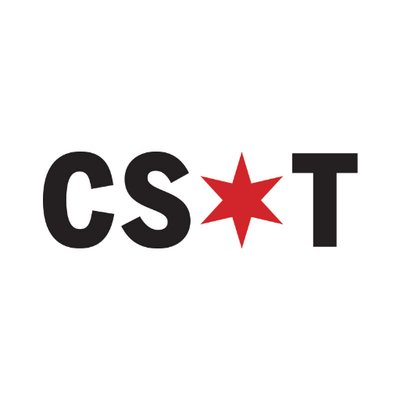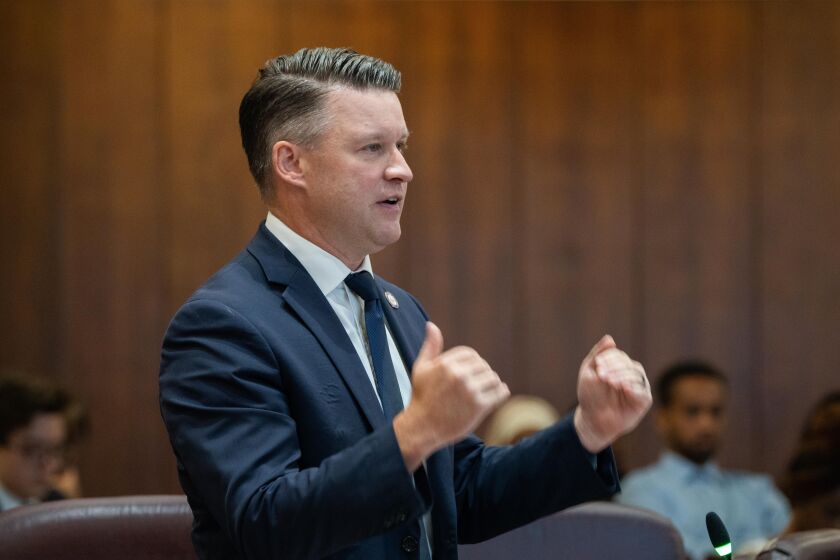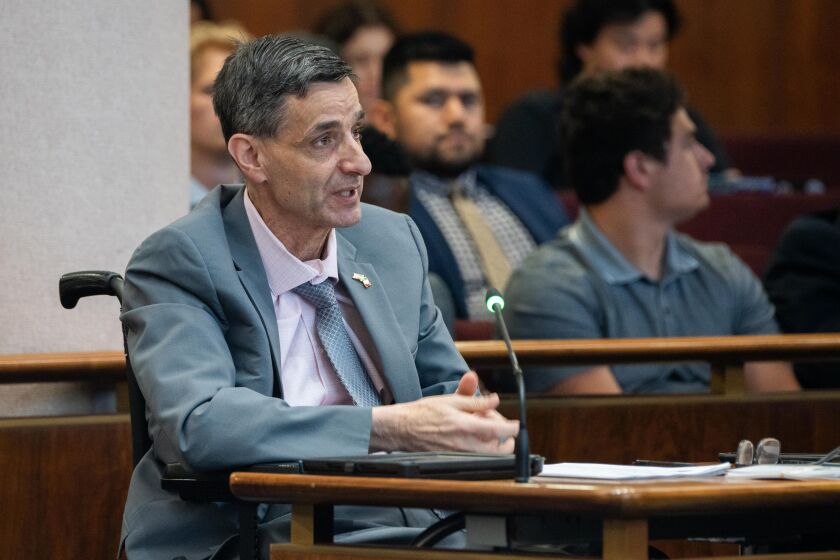



It’s a good thing the Chicago City Council takes the month of August off to re-charge before tackling the city budget. The 50 members may need it after Wednesday’s action-packed meeting.
The legislative version of the kitchen sink was emptied before the summer recess with a variety of measures impacting city finances, aesthetics and government oversight:
• Chicago’s inspector general would be limited to two four-year terms — and never again would a sitting mayor be permitted to stall the appointment of a new watchdog after failing to re-appoint the old one.
• Vintage signs at least 30 years old that are a part of Chicago’s “character and nostalgia” were granted a reprieve in five-year permit increments.
• Logan Square’s historic Congress Theater got a new lease on life, with help from a $27 million city subsidy.
• A Lincoln Avenue motel once known as a hot-pillow haven would be converted to “stabilization housing” for people with mental health and substance abuse issues.
• And alderpersons piled another $6.5 million onto the mountain of settlements tied to allegations of police abuse while putting the final piece of the puzzle in place to secure an agreement to supply water to the city of Joliet for the next century.
The mountain would have been even higher, if Council members did not take the unusual step of rejecting a $2 million settlement tied to the 2014 police shooting that killed Darius Cole-Garrit. The vote was 26 to 22.
Prior to the vote, Ald. Bill Conway (34th), a former assistant state’s attorney, noted that eight of the shots fired by officers who chased Cole-Garrit on foot were “in the front” of the victim’s body. That means he was “facing” the officers. Conway further noted the Independent Police Review Authority that preceded COPA had cleared the officers involved in a case that had no bodycam video.

Ald. Bill Conway (34th) speaks during Wednesday’s City Council meeting.
Pat Nabong/Sun-Times
Alderpersons did, however, sign off on two other police settlements for $750,000 each. One involved a high-speed police chase resulting in injuries. The second involved Bernard Kersh, who was body-slammed by a police officer with martial arts training after Kersh allegedly licked and spit on the officer. The high-speed chase involved Carlos Yanez Jr., who was critically wounded during the 2021 traffic stop that killed his partner, Ella French.
During the high-speed chase, Yanez Jr. and Chicago Police Officer Julian Rodriguez were accused of violating internal policy by failing to have their lights and sirens activated “continuously” and failing to spell out the reasons for the chase to police brass. The partners initiated the chase after stopping a car with an invalid out of state license plate that had been reported stolen. When spotted cash, smelled marijuana and ordered the driver out of the car, the driver sped off had stopped a car with an invalid South Carolina license plate and ordered the driver out of the car after seeing cash and smelling marijuana.
In other action: filling CPD vacancies, saving the Congress Theater
Before adjourning until September, the Council also:
• Approved an agreement making it easier to fill more than 1,700 Chicago Police Department vacancies with officers who have left CPD in recent years. Under the agreement, “re-hired” officers may return “if they have not been gone for 36 months or have reached age 50.” Rehires will be “placed at their last step prior to resignation on the current salary schedule for sworn personnel.” Officers categorized as “lateral hires” must be under 40. They will be required to complete “at least a 12-month probationary period. They will be placed “in an equivalent step on the current salary schedule.”
• Engaged in a spirited debate about Chicago’s “troubled history” of policing, then signed off on a $4.98 million settlement, all but $112,500 for attorneys’ fees, to resolve a class-action lawsuit that accused Chicago Police officers of making up to 2.5 million unconstitutional “investigatory stops and pat-downs” over the last decade.many of them while enforcing the city’s anti-gang and drug loitering ordinance. The vote was 43 to 6.
• Cleared the $27 million tax-increment-financing subsidy for renovation of the Congress Theater, 2135 N. Milwaukee, with a companion plan to extend the life of the Fullerton/Milwaukee TIF through 2027. That will give the development team led by Baum Revision time to complete a $87.8 million renovation. The landmark theater has deteriorated quickly after closing a decade ago and is in danger of being demolished.
• Passed an ordinance limiting Chicago’s inspector general to two-four-year terms. Joe Ferguson spent a record 12 years as Chicago’s inspector general with rigid timelines for choosing a replacement and a demand for written explanations if those deadlines are not met. When Mayor Lori Lightfoot took nearly nine months to replace Ferguson after forcing him out. The ordinance championed by Ethics and Government Oversight Chair Matt Martin (47th) is aimed at preventing both those things from happening again.
• Authorized Johnson to acquire the Diplomat Motel, 5230 N. Lincoln Ave., for $2.9 million and turn its 40 rooms into supportive housing, with wrap-around social services on site. In March 2020, the Hotel Julian, 168 N. Michigan Ave., was one of four Chicago hotels owned by Oxford Capital Group that agreed to rent rooms to isolate patients who tested positive for COVID-19 or had been exposed to someone who tested positive. That’s the model the Johnson administration wants to duplicate by acquiring the Diplomat in an experiment that could ultimately be replicated in all 50 wards. “I look forward to success and seeing this pilot take off,” local Ald. Andre Vasquez (40th) said before the vote.
• OK’d the mayor’s plan to protect Chicago’s most iconic “vintage signs” — including the Grace’s Furniture sign Logan Square. The change in the city code would allow historic signs to receive a new “vintage” classification provided they are well-maintained, at least 30 years old and accompanied by detailed information about the history of the sign. The permit must be renewed every five years. Signs hanging over the public way still require Council approval. If the company changes its name, the vintage sign would have to include the “same stylization of letters.”
• Approved a lease securing a 100-year deal to supply Lake Michigan water to the city of Joliet. Chicago will get $30 million in annual revenue, beginning in 2030. The lease agreement, with the Chicago Park District, will transfer a portion of Durkin Park in the South Side’s 18th Ward for construction of the pumping infrastructure needed to supply the water. Chicago taxpayers will provide $65 million in up-front financing for the Joliet infrastructure, but will be reimbursed over the course of the agreement through higher water fees. The Joliet deal could be the first of many. Surrounding towns including Channahon, Crest Hill, and Minooka have underground aquifers that are also drying up.
• Took a timid first step toward mandating municipal snow removal from Chicago sidewalks, a potentially politically-perilous promise for the expectation that it creates. The ordinance championed by Ald. Gilbert Villegas (36th) gives a handful of city departments 60 days to create a working group to study sidewalk snow removal and determine where and how to test the new service, the cost and how to pay for the pilot.
Shoveling sidewalks ‘isn’t feasible,’ Sposato says
The recommendations — including whether to hire private contractors or have city employees do the work — must be delivered “no later than May 31, 2024.” The goal is to launch the pilot program by January 2025.
Veteran Ald. Anthony Beale (9th) opposed the move, fearing the inevitable backlash.
“I don’t want to get those phone calls saying, `When are you gonna plow my sidewalk? ... When I get those calls, I’m gonna forward them to your office,” Beale told Villegas. Ald. Nick Sposato (38th) added, “The financial ramifications will be monumental. It’s gonna be a disaster. I’m pretty sure they’ll decide this isn’t feasible.”

Ald. Nick Sposato (38th) said having the city shovel sidewalks “isn’t feasible.”
Pat Nabong/Sun-Times
• Took a unanimous voice vote to approve Johnson’s appointment of Mary Richardson-Lowry as corporation counsel. She’s the first Black woman to serve as the city’s top attorney. A former school board president and city buildings commissioner, she is the third alum from Richard M. Daley’s administration to join the Johnson administration. During her confirmation hearing this week, Richardson-Lowry told alderpersons she does not believe the Council needs its own legal counsel. Though the Law Department has 37 vacancies, Richardson-Lowry said it has “extraordinary talent” that alderpersons must have access to. “Creating two groups of lawyers going at each other will not solve problems. It’ll create more,” she said.
Also during Wednesday’s meeting, Villegas introduced an ordinance to make permanent the now-expired Guaranteed Minimum Income Pilot he championed. Under the plan, participants would need an household income at or below 300% of the federal poverty guidelines. They would remain eligible for the $500 monthly stipend, only after verifying annually that their household income remains at or below 350% of the federal poverty guidelines. The annual appropriation for the program “shall be not less than $30 million.”
An ordinance giving restaurants two years to phase out the sub-minimum wage for tipped workers was introduced, but sent to the Rules Committee at Beale’s request, citing business opposition. He called it a “job killer.”
Ald. Carlos Ramirez-Rosa (35th), the mayor’s floor leader, reiterated that negotiations will continue aimed at giving Chicago restaurants longer than two years to phase out the lower wage. Mayoral ally Jessie Fuentes (26th) said she was open to four years, but no more.
Johnson proposed raising the requirement for electric charging stations at residential projects in Chicago and introduced a resolution calling for subject matter hearings on the expansion of mental health and crisis response services in Chicago. The hearings are expected to lay the groundwork for the new mayor to honor his campaign promises to re-open shuttered mental health clinics and expand non-police response to mental health emergencies.
Ald. Ray Lopez (15th) introduced ordinances that would ban the sale of fur products in Chicago, legalize video gaming and outlaw so-called “sweepstakes” machines that have proliferated in the city.
